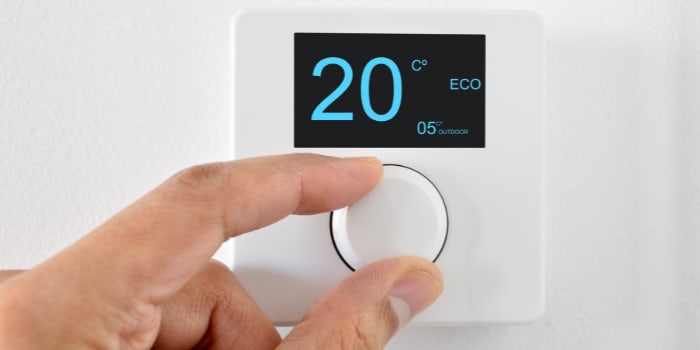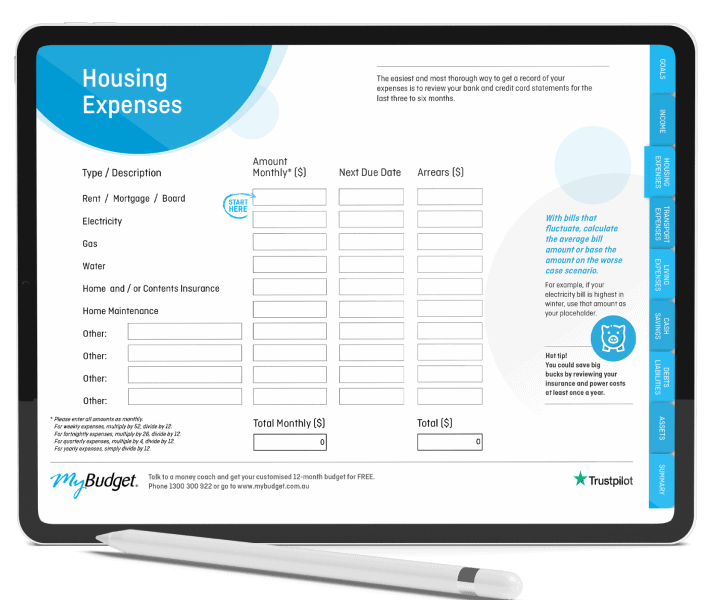Energy saving tips for every season
Sick of worrying about your next energy bill? Keep reading for our 15 favourite energy saving tips that include ways to cut heating costs in winter AND slash your summer bill shock!
It’s tempting and easy to crank up the heating in winter and set it to ‘tropical’ to enjoy year-round comfort inside our homes, but it certainly comes at a cost. The average Australian household spends 40% of their energy consumption on heating and cooling, plus 21% on water heating. That’s nearly two-thirds of your household’s energy costs, which means any savings in those areas can really reduce your utility bills.
In fact, with electric heating every one degree increase on the thermostat results in around 10% more energy being used. The same concerns apply in summer, with heat waves often causing serious spikes in electricity usage, leaving households sweating when they get their next bill. This means that even small heating and cooling savings can have a big effect on your power bills. It also proves that it’s worth going to the effort and investment of reducing your heating and cooling use as one of the main ways to reduce power bill expenses.
The best news is that it’s not one big change or investment that will make the difference. It’s a host of small changes that will contribute to reduced energy bills in winter and summer. Just as with budgeting, it’s little habits that add up to big savings over time!
These energy saving tips below can help you save no matter the season and stop you despairing over “Why is my electricity bill so high?” whenever a new bill lands in your mailbox.
Tip #1. Set your thermostat and save

If you’re wondering how to save money on heating bills, keep the balance between comfort and cost in mind: energy experts recommend that the ideal heating thermostat is set between 18-21°C.
With ducted heating, every extra degree of warming adds about 10% to running costs. In summer, beware blasting the air con, or you’ll blast a hole in your budget. Set it to between 24-26°C, but check your units for the most efficient settings, as this is definitely one of the ways to save money on heating and cooling.
Tip #2. Clean the vents and filters on your heater/air conditioner
Follow the manufacturer’s guidelines to ensure the system is running as efficiently as possible. Dirty dust filters mean that the machine has to work harder, which uses more energy. Many manufacturers also offer other energy saving tips on their website, so it can pay off to spend some time searching around for advice specific to your type of heating and cooling system.
Tip #3. Heat and cool only the living areas
Looking for ways to cut heating costs? In winter, keep the heat where you need it by closing bedroom and bathroom doors and only heat areas of the house you’re actually in! Open plan homes are notorious for being expensive to heat and cool – the addition of doors in strategic places may be a good long-term investment in power saving.
Tip #4. Wear more in winter
Instead of turning up the heat, the cheaper option is to put on more clothes. You can also reach for a blanket in the winter rather than always turning the heater on. By keeping a few blankets around the house, you’ll be able to quickly grab one of those and turning on the heater will not be as tempting.
As a bonus, it can feel nice and cosy to curl up on the couch with a cup of tea and a crochet rug and you can teach your kids energy saving tips in winter from a young age!
Tip #5. Close your blinds and curtains
Most heat loss in winter in a home occurs through the windows. In winter, keep them closed when it’s cold or dark and open when it’s sunny! Open the curtains and bring natural sunlight and warmth inside to avoid having the lights and heater on during the day. And if you’re looking for ways to reduce the power bill in summer, keep blinds and curtains shut to block the heat of the sun from warming up your home even more than it already is!
Tip #6. Make sure your doors and windows have an airtight seal
This is one of our favourite energy saving tips. Plug gaps and add weather stripping to doors and windows. Caulking can fix small gaps and a door snake is the perfect solution for draughty doors, while weather stripping or window inserts (available from hardware stores) are a great solution for draughty windows as they ensure your doors and windows achieve an airtight seal when closed.
You can also buy thermal window insulation kits that start around $10 plus shipping. Apply the plastic film in winter and remove it when the weather warms up. In summer, if possible, open your windows in the evening for a couple of hours to let heat out of the house that has built up during the day, and then you might not even need to run your air conditioner or fan at night!
Tip #7. Set and forget
If you set a timer on your heater and air conditioner you won’t have to worry about remembering to turn them off at bedtime or when you leave the house.
Tip #8. Check what temperature your hot water system’s set to
The optimum water temperature for storage hot water systems is 60–65°C, in the tank. For instantaneous systems, no more than 50°C.
Tip #9. Insulate your hot water pipes
Insulating hot water pipes between the tank and the taps will help to minimise heat loss. Synthetic rubber insulation is best.
Tip #10. Use less hot water
Shorter showers, cold water laundry washing and only running the dishwasher when full are all easy ways to cut down on heating costs. Using hot water to wash your clothes is not always beneficial and cold water is just as effective.
Tip #11. Consider the cost of convenience

If you’ve been following our budgeting tips as well as our energy saving tips and have meal-prepped and frozen your family’s dinners for the week, take frozen food out of the freezer a few hours before you plan to cook it. That way it will defrost naturally and you can avoid using the microwave.
Tip #12. Hang your washing out instead of using the tumble dryer
When it’s sunny outside, hanging up your washing is one of the easiest ways to reduce the power bill. Some older clothes dryers cost around $1.40 per hour to run, so you’ll save money if you use the free drying power of the sun to dry your laundry, plus it’s also better for your clothes, so you’ll get a longer life out of them.
Tip #13. Fill your refrigerator up
Believe it or not, a full refrigerator or freezer uses less energy. In between shops, you can fill up empty space in your fridge with reusable water bottles, so then you’ll always have a chilled bottle of water to grab and go!
Tip #14. Check the efficiency of your appliances

LED light bulbs use less power AND last longer, so next time a light bulb blows, replace it with a more energy-efficient alternative. When it comes time to replace your appliances, go for alternatives with the highest energy rating. You should also get rid of, or switch off any appliances you have that are pointless.
For example, if you have a second fridge that you don’t need then get rid of it. If you have a second (or third) television in the spare room that only gets watched once in a while, unplug it from the wall when it isn’t being used. This is such a simple way to reduce power bills but so effective.
It is also important to keep an eye on the seal on your refrigerator. The seal of older fridges and freezers can deteriorate over time, causing it to literally leak cold air. These can be replaced, and this effort may be worth it if you suspect your fridge is a factor in your high electricity bill.
Tip #15. Shop around for cheaper power
Okay, so this one might not impact how much energy you use, but it’s important to make sure you’re not paying too much for your energy bills. Electricity prices have fallen in the last couple of years and it’s estimated that consumers are overpaying by about $500 million.
If you’re serious about finding ways to save on household bills, shop around to make sure you’re on the best deal for your electricity and gas. Make sure you don’t just check what the cost is per kW for electricity, you also want to compare providers based on their daily supply charges, and whether you can save by being on direct debit or going paperless on your bills.
You may also want to consider whether going solar makes sense for you. Check and see whether there are any government programs that can help you recoup some of the initial set up costs of getting solar installed, or with the ongoing maintenance costs.
Did any of these ways to cut heating costs and other energy saving tips surprise you?
Do you need help with saving up for bills? Our caring personal budgeting experts at MyBudget can show you how to budget and save as a family. Call us today at 1300 300 922 or enquire online for a free consultation.
Ready to find out more?
Call 1300 300 922 or get started today

